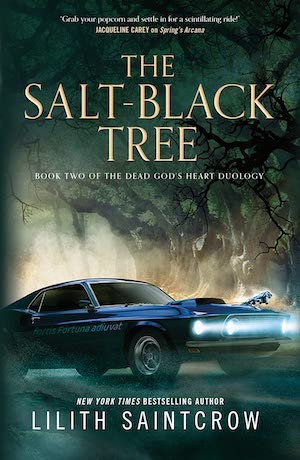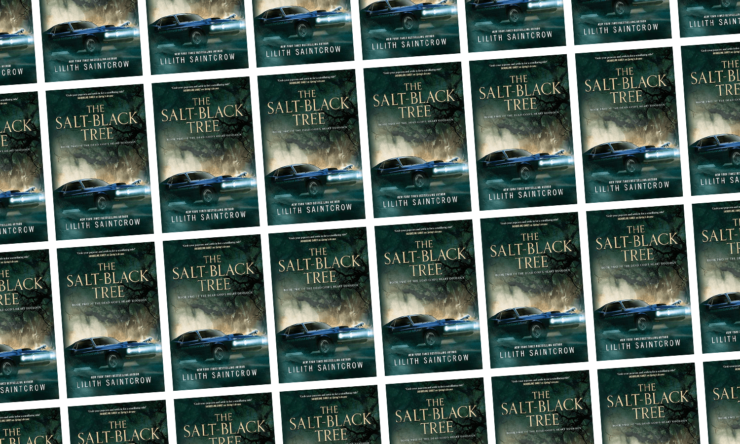The Salt-Black Tree is the second novel in Lilith Saintcrow’s Dead God’s Heart duology, after Spring’s Arcana. It picks up precisely where the previous volume left off, and I don’t recommend starting here: Dead God’s Heart is one story in two volumes, rather than two linked narratives. A relatively short tome, weighing in at under 300 pages, The Salt-Black Tree ups the ante on the atmospheric roadtrip-quest across America begun in Spring’s Arcana, driving Nat Drozdova into full acknowledgement of who and what she is—and what her bitter, distant, dying mother Maria actually wants from her.
Maria Drozdova is an incarnation of spring, dragged across the sea to America by the belief of immigrants. Nat is her daughter, born in the new land out of the old and the new, and if the natural cycle were allowed to take its course, she would come into her power as her mother faded and died. But Maria raised Nat mortal, ignorant of the world of divinities, and when death grew closer, sent her to bargain with Baba Yaga—Grandmother Winter—for Maria’s life. But Maria never meant for Nat to come into her own power: what Maria was bargaining for was the right to eat Nat and thus take her native power; and what Maria is counting on is that Nat is naive enough, trusting enough, guilty enough, loves her enough, to let her.
Buy the Book


The Salt-Black Tree
Nat, whose company on her reluctant roadtrip has been gangster-divinity Dmitri “Dima” Konets—the man who cut out his own heart to stay himself in a new land, whose literal heart Maria Drozdova stole from Baba’s keeping: a man who promises he will keep her safe until he has what he wants, but threatens to kill her afterwards—is fast losing her naivety, and her lingering disbelief that any of this is even possible. But reckoning with the truth of her mother’s intentions is harder even than being pursued by faceless hungers across the ancient-and-new landscape of America, and harder even than holding her own in Dima’s by turns friendly and abrasive presence. Love and guilt are powerful things, and it is difficult to walk away from someone—even an abusive someone—you love, knowing that it means they will die.
The Salt-Black Tree is a hero’s journey in the classic sense, a trail of trials leading to greater power and knowledge. Saintcrow is playing with a wide mythological pantheon, and leans hard on cultural or mythic references that I don’t always follow, but the figures that Nat encounters—Nell Bonney, once Shamhat, running a diner in Deadwood; Marisol De Flores, an incarnation of summer, offering gifts in Los Angeles; Raven and Coyote, tricksters around a fire in the middle of the woods; the old woman Georgia, another incarnation of winter, ruthless, demanding, and truthful in the high desert; Marie Laveau holding court in the Lousiana bayou—are richly drawn, vivid, and dense with meaning and significance. They are guides and mentors along Nat’s way, but also, in the way of mythic journeys, obstacles and challenges at the same time. Saintcrow combines Nat’s katabasis into the underworld of American divinity with her journey towards apotheosis, bringing them both together in three days and nights in the salt-black tree of the title, from which Nat will emerge either fully a divinity or—sacrificed to fuel her mother’s survival—not at all.
Not everyone lives to grow up.
The Salt-Black Tree is told partly from Nat’s point of view and partly from Dima’s, with brief forays into Maria’s perspective. Dima is an interesting counterpoint to Nat: cynical, bitter, with a chip on his shoulder the size of a boulder and a mile-wide streak of old-fashioned chauvinism, his attitude is “if you want something, take it and stick it to The Man.” He’s a thief and a murderer, but he’s honest about what he is, and he has his own stubborn flinty sense of… not exactly honour, but definitely pride. Dima is too proud to ever do what Maria has tried to do. And in the days he’s spent in close proximity to Nat, he’s begun to develop something almost like affection for her. Grudging respect, at least. A certain protective… something. It’s not a romantic or a sexual chemistry, or at least it is not easily read that way, but there’s definitely a bond between them by the end, one felt on both sides.
The Salt-Black Tree is a powerful, understated work. The characters are drawn in strong, compelling strokes, and the prose is vivid with atmospheric detail. At its core, it’s about growing up, growing out and away from old patterns; learning to see an abusive relationship for what it is, and learning to stop sacrificing who you are to win a love that will never come. Saintcrow clothes this very human experience in larger-than-life metaphysics of godhood and divinity, narrative metaphors filled with power and presence. But at the base of it, this is the story of a mother who wants her daughter to sacrifice everything she is to make said mother happy, and what the daughter does when she realises that nothing she does will ever win her mother’s love.
The Dead God’s Heart duology is a compelling and entertaining story. I can recommend both its volumes.
The Salt-Black Tree is published by Tor Books.
Liz Bourke is a cranky queer person who reads books. She holds a Ph.D in Classics from Trinity College, Dublin. Her first book, Sleeping With Monsters, a collection of reviews and criticism, was published in 2017 by Aqueduct Press. It was a finalist for the 2018 Locus Awards and was nominated for a 2018 Hugo Award in Best Related Work. She was a finalist for the inaugural 2020 Ignyte Critic Award, and has also been a finalist for the BSFA nonfiction award. She lives in Ireland with an insomniac toddler, her wife, and their two very put-upon cats.










